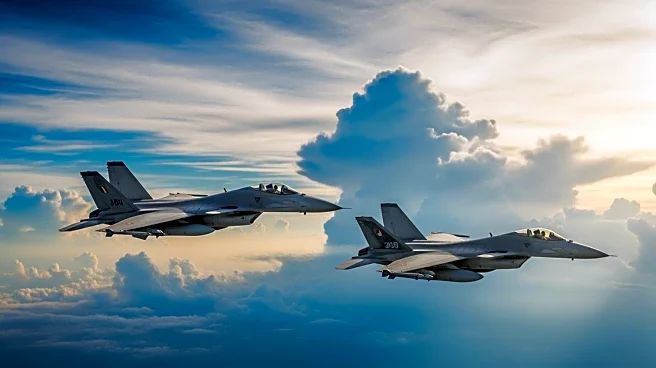What's Happening?
Indonesia is set to purchase 42 Chengdu J-10C fighter jets from China, marking its first major aircraft acquisition from a non-Western country. Defense Minister Sjafrie Sjamsoeddin announced the deal,
which is part of a broader initiative to modernize Indonesia's military capabilities. The purchase, valued at over $9 billion, has been approved by the Finance Ministry. This move is seen as a significant shift in Indonesia's defense strategy, traditionally reliant on Western suppliers. The Indonesian Air Force is currently reviewing the jets to ensure they meet the country's defense needs.
Why It's Important?
The acquisition of Chinese fighter jets by Indonesia could have significant geopolitical implications, potentially altering regional power dynamics. As Southeast Asia's largest economy, Indonesia's decision to diversify its military suppliers may signal a shift in its security orientation amidst China's growing influence in the region. This move could affect Indonesia's relationships with traditional Western allies and impact regional security strategies. The deal also highlights Indonesia's efforts to strengthen its defense industry and military capabilities under President Prabowo Subianto's administration.
What's Next?
Indonesia is expected to finalize the purchase and begin receiving the fighter jets soon. The arrival of these jets will likely enhance Indonesia's air defense capabilities. The country is also pursuing other military acquisitions, including French Dassault Rafale jets and Turkish KAAN fighters, indicating a comprehensive approach to modernizing its military arsenal. Observers will be watching how this deal influences Indonesia's diplomatic relations and regional security posture.
Beyond the Headlines
The decision to purchase Chinese fighter jets may reflect Indonesia's strategic balancing act between major global powers. While politically non-aligned, Indonesia's choice could be interpreted as a response to China's growing military presence in Southeast Asia. This development may prompt discussions on the ethical and strategic implications of military procurement from non-traditional partners.











